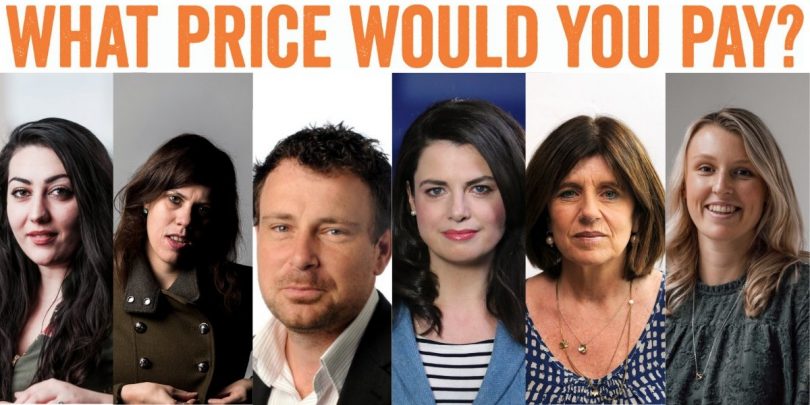IS HAVING A SUPPORTIVE EDITOR THE KEY TO QUALITY JOURNALISM?
TYLER WRIGHT
The Walkley Foundation held a panel discussion between five journalists at RMIT University’s Kaleide Theatre on Thursday night, moderated by INQ editor Lauren Molan.
Zena Chamas, Louise Milligan, Grant McArthur, Caroline Wilson and Lisa Martin made up the panel to discuss the impact of their journalism on themselves and others.
Molly Magennis on Twitter: “Getting ready for the #Walkley panel ‘What price would you pay?’ Panelists are:- Zena Chamas @chamas_zena – Lisa Martin @LMARTI – Grant McArthur @mcarthurg – Louise Milligan @Milliganreports – Caroline Wilson @JournalismRmit @walkleys @RMIT pic.twitter.com/ZR5GvxkyAS / Twitter”
Getting ready for the #Walkley panel ‘What price would you pay?’ Panelists are:- Zena Chamas @chamas_zena – Lisa Martin @LMARTI – Grant McArthur @mcarthurg – Louise Milligan @Milliganreports – Caroline Wilson @JournalismRmit @walkleys @RMIT pic.twitter.com/ZR5GvxkyAS
The Walkley Foundation for Journalism launched the ‘What Price Would You Pay?’ campaign early in 2019, asking Australians to back quality journalism.
Grant McArthur, health journalist for the Herald Sun, said that “good” editors are the “strongest people” to provide “support” to journalists.

Grant McArthur discussing with the panellists and the audience the challenges he’s faced throughout his career and explaining the importance of having a good editor
“When you see that level of support, you know you’ll get there,” the health journalist said. “You’re not going to be left hanging.”
“A good editor is someone who’s willing to write a cheque to buy you a $20,000 barrister” for legal support, Guardian journalist Lisa Martin said.

The Age reporter and Walkley-winning Journalist Caroline Wilson on the panel talking to the audience about her experience with editors
It’s just as much about the emotional support,” The Age journalist Caroline Wilson said, “obviously financial as well.”
Wilson said that “AFL CEO’s” have “torn” her apart while editors in chief on some occasions have been defensive, and on others have been “silent.”
“You need editors who don’t care so much about fraternizing with the top end of town,” or getting “tickets to the Brownlow,” Wilson said.
LOUISE MILLIGAN CALLS FOR JOURNALIST PRIVILEGE
OLIVIA SMITH
Louise Milligan, award-winning ABC journalist, sat confidently at the end of the panel, appearing stylishly put together, despite just coming off a flight. Spoken with self-assurance, Milligan stressed the need for legislation to strengthen journalist privilege at The Walkley Foundation’s gala event, ‘What Price Would You Pay?’ last night.
“At the moment it’s discretionary for a judge, and in the hands of the wrong judge its potential tyranny,” she said. “These are fundamental issues of transparency and democracy,” she continued.

Walkley-winning investigative journalist Louise Milligan discussed the many challenges she faced during her investigation into George Pell, including facing contempt of court.
Milligan recalls the “eight months of trauma,” she endured while tangled in the secretive court proceedings of Cardinal George Pell, facing contempt of court over the anonymity of her sources.
“Prosecuting journalists in secret, for not giving sources to people alleged of multiple counts of child sexual offence is problematic at best,” she said. Milligan narrowly avoided prosecution as her legal team inquired to the Victorian Attorney General under the state’s charter of human rights.
Molly Magennis on Twitter: “”For people who have been victims of abuse, betrayal was so much worse” says Louise Milligan, referring to when she was asked to give up her confidential sources surrounding her investigation into George Pell @Milliganreports @walkleys @JournalismRmit #walkleys / Twitter”
“For people who have been victims of abuse, betrayal was so much worse” says Louise Milligan, referring to when she was asked to give up her confidential sources surrounding her investigation into George Pell @Milliganreports @walkleys @JournalismRmit #walkleys
Currently, Australian shield laws cannot confirm absolute privilege but rather something closer to the discretion of the court.
“If the journalist privilege was absolute I wouldn’t of faced potential prosecution and jail,” Milligan told me the day following the Walkley event.
Molly Magennis on Twitter: “”We have to strengthen the journalist privilege,” says Walkley award winning journalist Louise Milligan. @walkleys @Milliganreports @JournalismRmit / Twitter”
“We have to strengthen the journalist privilege,” says Walkley award winning journalist Louise Milligan. @walkleys @Milliganreports @JournalismRmit
Milligan holds herself to the highest ethical standards, stating that to maintain integrity as a journalist, “we have to be able to say that we did everything to do the right thing by people.”
During the trial, Milligan didn’t tell her sources she potentially faced prosecution, as she didn’t want to put them in an “awkward position,” of feeling pressure to reveal their identities. This would be “emotional blackmail,” she told me.
Milligan said that although this is “not a normal scenario” legislation and guidelines need to be designed around the “worst-case scenario.”
Molly Magennis on Twitter: “When asked by a student audience member if the panel believes whistle blowers are less likely to come forward due to recent events, Louise Milligan gives a strong yes. @walkleys @JournalismRmit #walkleys / Twitter”
When asked by a student audience member if the panel believes whistle blowers are less likely to come forward due to recent events, Louise Milligan gives a strong yes. @walkleys @JournalismRmit #walkleys
Milligan believes, with the current lack of media protections, more journalists need to be aware of the potential risks to themselves as well as their sources.

All the panellists discussing the price they’ve had to pay during their journalism careers.
“No one ever turns their mind to this until their back’s against the wall,” she told me.
Milligan is hoping that by drawing the attention of lawyers to this issue “that it’s something that will be on the radar”.
VOICE OF THE AUDIENCE
OLIVIA (UMANG) DAVENDRA
I interviewed the audience about relevant topics regarding journalism and here are their responses:

Olivia interviewing a first-year RMIT journalism student

From left to right: Grant McArthur, Lisa Martin, Lauren Molan, Louise Milligan, Zena Chamas, Alex Wake (RMIT Journalism program manager) and Louisa Graham (Chief executive of the Walkley Foundation)



